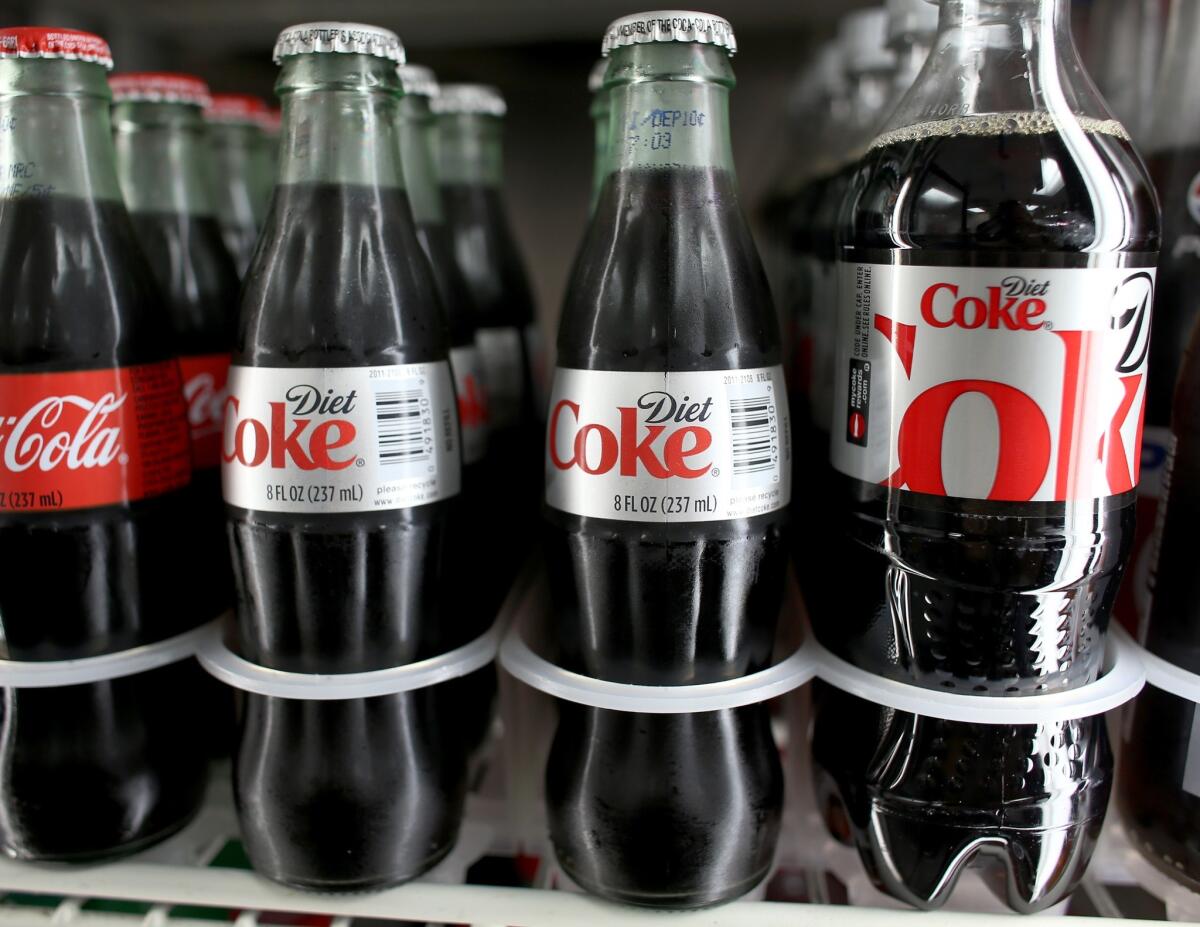Diet soda mixed with pregnancy might be a recipe for childhood obesity, study suggests

Among pregnant women, daily consumption of beverages made with artificial sweeteners was associated with an increased risk that their children would be overweight when they reached their first birthday.
- Share via
Could diet soda be fueling the rise of childhood obesity?
A new study of more than 3,000 Canadian children and their mothers finds a strong link between the amount of artificially sweetened beverages the women drank during pregnancy and the body mass index of their babies.
Compared with women who stayed away from the drinks while they were pregnant, those who consumed them on a daily basis were twice as likely to have their babies classified as overweight when they celebrated their first birthday, according to a report published Monday in JAMA Pediatrics.
See the most-read stories in Science this hour >>
Researchers also found that when mothers had a daily habit of drinking beverages flavored with artificial sweeteners during pregnancy, their 1-year-olds had BMI z-scores that were significantly higher than those of their counterparts. (The z-score is a statistic that measures how much a child’s BMI deviates from the average for children of the same age and gender.)
However, the researchers could not find any link between consumption of high-calorie sugar-sweetened beverages during pregnancy and the risk that a baby would be overweight at age 1.
“To our knowledge, our results provide the first human evidence that artificial sweetener consumption during pregnancy may increase the risk of early childhood overweight,” wrote the authors of the study, which was led by Meghan Azad of the University of Manitoba in Canada.
Some evidence for a link between prenatal exposure to artificial sweeteners and excess weight gain after birth has been found in animals, the authors noted. To see whether the same might be true in people, they turned to data on 3,033 mother-child pairs who participated in the Canadian Healthy Infant Longitudinal Development study.
All of the mothers completed a food frequency questionnaire detailing the foods and drinks they consumed while they were pregnant. Nearly 90% of the babies got checkups one year after they were born.
Among the moms, 30% said they drank artificially sweetened beverages while they were pregnant – including 5% who said they did so every day. In addition to diet soda, these drinks included coffee and tea sweetened with packets of Equal, Splenda and the like.
The 30% of women who consumed these no-calorie sweeteners were different from the rest of the moms in other ways as well. For instance, they had higher BMIs and were more likely to be smokers. When their babies were born, they didn’t breastfeed for as long and introduced solid foods earlier.
But even when the researchers controlled for all those differences, they still found a significant correlation between daily consumption of artificially sweetened beverages and their babies’ BMI. After considering the effects on boys and girls separately, they found that the link was only significant in boys.
Intriguingly, whether or not mothers opted for diet drinks during pregnancy had no effect on their babies’ weight at birth. To the researchers, this finding suggests that the influence – if any – of artificial sweeteners comes into play not during fetal development but after the infant is born.
The incidence of childhood obesity has been rising steadily for decades, and studies identifying more than 1 in 5 preschoolers as overweight or obese show that the path begins at a very young age. With more than half of Americans consuming artificial sweeteners – many in an attempt to reverse or prevent obesity – the temptation to connect the dots is strong.
Although the new report raises serious questions about whether diet soda consumption during pregnancy can influence a baby’s future weight, much more research will be needed to provide the answers. The study authors cautioned that surveys asking people to recall what they drank in the last several months might not be entirely accurate.
They also noted that their data did not distinguish between different types of artificial sweeteners, nor did they account for artificial sweeteners used in foods.
Still, the authors concluded, “given the current epidemic of childhood obesity and the widespread consumption of artificial sweeteners, further research is warranted.”
Two independent obesity researchers agreed. In an editorial published alongside the study, University of Minnesota epidemiologist Mark Pereira and Dr. Matthew Gillman of Harvard Medical School called the findings “intriguing” and worthy of further investigation. Studies in animals and even small trials in pregnant women might help uncover a mechanism that could explain the apparent link.
In the meantime, they wrote, women should consider adding diet drinks to the list of items that are off-limits during pregnancy and opt for water instead.
Follow me on Twitter @LATkarenkaplan and “like” Los Angeles Times Science & Health on Facebook.
ALSO
As kids get fatter, fewer parents can tell their children are obese
Experts zero in on pizza as prime target in war on childhood obesity
Medical cost of childhood obesity is $19,000, researchers say




